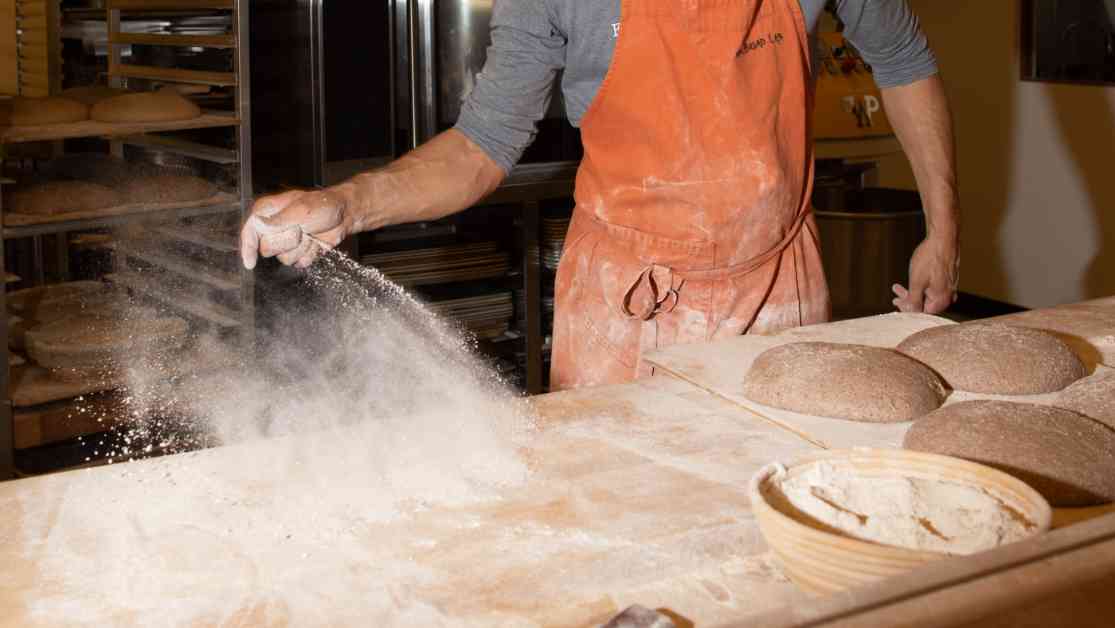Bakers Innovate with Climate-Resilient Wheat for Tastier Bread
Robin Morgan, a key figure at Washington State University’s Bread Lab, is on a mission to revolutionize the world of whole wheat bread. Together with a team of dedicated scientists and researchers, Morgan is pushing the boundaries of traditional baking to create loaves that not only withstand the challenges of a warming world but also deliver an unparalleled taste experience.
The Bread Lab, located in the Skagit Valley, is a hub of innovation where the art of bread-making meets cutting-edge science. Here, bakers like Mel Darbyshire work tirelessly to craft loaves of bread that defy convention. Using a special blend of whole wheat flour known as the “Climate Blend,” the team at the Bread Lab is paving the way for a new era of climate-resilient and delicious bread.
The Perfect Loaf: A Product of Innovation and Dedication
As Darbyshire pulls out trays of freshly baked loaves from the oven, the aroma of warm bread fills the lab. Each loaf, made from 100% whole wheat flour, is a testament to the meticulous research and experimentation carried out by the team. The Climate Blend, a mix of different types of wheat carefully selected for their resilience to extreme weather conditions, is at the heart of these delectable creations.
One of the standout features of the Climate Blend is its ability to withstand the increasingly intense weather patterns brought on by climate change. By harnessing the power of diverse wheat varieties, the Bread Lab is not only ensuring the survival of this essential crop but also elevating the taste and quality of whole wheat bread to new heights.
Taste and Resilience: The Dual Focus of the Bread Lab
For Morgan and his team, creating climate-resilient wheat is just one part of the equation. Equally important is the quest to make whole wheat bread more appealing to consumers. Through a combination of innovative breeding techniques and expert baking methods, the Bread Lab has succeeded in producing loaves that are not only nutritious and sustainable but also incredibly delicious.
The Approachable Loaf, a signature creation of the Bread Lab, embodies this ethos perfectly. Made entirely from whole wheat flour, this loaf is a testament to the lab’s dedication to creating a product that is approachable, familiar, and above all, tasty. By debunking the myth that whole wheat bread is bland or unappealing, the Bread Lab is opening up new possibilities for consumers to embrace healthier and more sustainable food choices.
Subheading 1: The Science Behind Climate-Resilient Wheat
The development of climate-resilient wheat is a complex and multifaceted process that requires a deep understanding of both agricultural practices and genetic diversity. At the Bread Lab, scientists like Stephen Jones are at the forefront of this groundbreaking research, working tirelessly to breed wheat varieties that can thrive in the face of changing climate conditions.
Jones, a seasoned wheat breeder, founded the Bread Lab in 2009 as a response to the industry’s narrow focus on producing uniform white flour. Recognizing the need for greater genetic diversity in wheat crops, Jones set out to create blends of wheat that could withstand the challenges posed by climate change. By preserving thousands of wheat varieties in a temperature-controlled storage room, the Bread Lab ensures a rich gene pool from which to draw for its breeding programs.
The Importance of Genetic Diversity in Agriculture
A key principle guiding the work at the Bread Lab is the importance of genetic diversity in agriculture. In a world where climate change is increasing the likelihood of extreme weather events and new pest and disease outbreaks, maintaining a diverse gene pool is crucial for the long-term resilience of crops like wheat.
Jones and his team believe that by introducing chaos into the field in the form of genetically diverse wheat varieties, they can better equip farmers to deal with the uncertainties of a changing climate. The success of the Climate Blend during the 2021 heat wave in the Pacific Northwest is a testament to the effectiveness of this approach, as farmers like Keith Kisler saw their crops thrive while others wilted under the extreme conditions.
Subheading 2: The Environmental and Nutritional Benefits of Whole Wheat
In addition to its climate resilience, whole wheat offers a range of environmental and nutritional benefits that make it a superior choice over refined white flour. Ema Tanovic, an analyst at Boston Consulting Group, notes that consuming whole grains can quadruple the nutritional impact of wheat while reducing its environmental footprint by 20%.
The process of refining wheat to produce white flour results in the loss of valuable nutrients found in the bran and germ of the kernel. By consuming whole wheat products, consumers can maximize their nutritional intake while minimizing food waste and environmental impact. Jones estimates that transitioning to whole wheat could increase food production per acre by as much as 30%, making it a win-win for both farmers and consumers.
The Bread Lab’s Role in Promoting Whole Wheat Consumption
At the Bread Lab, the focus is not just on developing climate-resilient wheat but also on promoting the consumption of whole wheat products among consumers. The Approachable Loaf, with its soft texture and familiar taste, is a prime example of how whole wheat bread can be both nutritious and delicious.
Through initiatives like pop-up bread sales and community outreach programs, the Bread Lab is working to educate consumers about the benefits of whole wheat and encourage them to make more sustainable food choices. By combining scientific research with hands-on baking experience, the lab is changing the way people think about whole wheat bread and inspiring a new generation of bread enthusiasts.
Subheading 3: The Future of Climate-Resilient Wheat
As climate change continues to impact our food systems, the need for climate-resilient crops like the Climate Blend has never been greater. The Bread Lab’s innovative approach to breeding wheat varieties that can withstand extreme weather conditions serves as a model for sustainable agriculture in a changing world.
Looking ahead, the Bread Lab is committed to expanding its research and outreach efforts to reach more farmers and consumers. By partnering with organizations like King Arthur Flour to distribute regeneratively grown Climate Blend flour, the lab is paving the way for a more sustainable and resilient food future.
Through a combination of scientific expertise, agricultural innovation, and culinary creativity, the Bread Lab is setting a new standard for whole wheat bread that is both delicious and environmentally friendly. With each loaf that comes out of their ovens, the lab is proving that a more sustainable food system is not only possible but also incredibly tasty.
In Conclusion
The Bread Lab’s pioneering work in developing climate-resilient wheat and promoting whole wheat consumption is a testament to the power of science and collaboration in addressing the challenges of climate change. By prioritizing taste, nutrition, and sustainability, the lab is leading the way towards a more resilient and delicious future for bread lovers everywhere. As consumers become more aware of the environmental and health benefits of whole wheat, the Bread Lab’s approachable and innovative products are sure to inspire a new wave of appreciation for this humble staple.



























